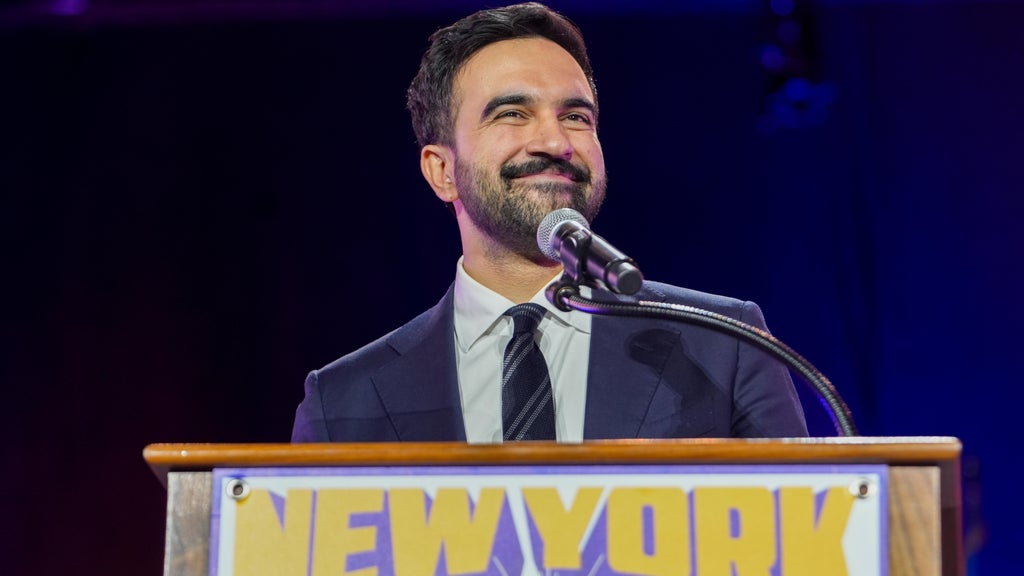Business
Zohran Mamdani Advocates for City-Run Grocery Stores in NYC

Zohran Mamdani, the newly elected mayor of New York City, has proposed a controversial initiative to establish city-run grocery stores aimed at addressing food affordability and access. He envisions these stores as a public option for produce, particularly in underserved areas known as food deserts. This initiative, which he estimates will cost $60 million, seeks to provide a viable alternative to the private grocery sector in a city where food prices are often prohibitive for many residents.
Mamdani’s proposal includes establishing at least one grocery store in each of the city’s five boroughs. The aim is to not only alleviate hunger but also to offer New Yorkers a choice in their grocery shopping. “The job of city government is not to tinker around the edges while 1 in 4 children across our city go hungry,” he stated. His plan involves the city purchasing goods at wholesale prices, managing the warehousing and distribution, and working closely with local neighborhoods to tailor product selections.
The financing for this ambitious plan could come from redirecting existing subsidies that New York City currently provides to private grocery store owners. Mamdani suggests that these funds, amounting to millions of dollars annually, could be better utilized by supporting city-controlled stores. Additionally, he proposes raising the corporate tax rate to 11.5% and introducing a flat 2% tax rate for individuals earning over $1 million as further revenue sources.
Challenges and Opposition
Despite Mamdani’s vision, the initiative faces considerable opposition from various stakeholders, including local grocery store owners and members of the City Council. Political expert J.C. Polanco from the University of Mount Saint Vincent notes that convincing City Council members to support city-run stores may be challenging. Council members often prioritize local businesses, such as bodegas and delis, which are integral to their communities. “The odds of having City Council support for city-run grocery stores is very little, considering that these city councilmembers have dozens of bodegas in their districts,” Polanco remarked.
Prominent figures like billionaire supermarket owner John Catsimatidis have voiced strong criticism of Mamdani’s proposal. Catsimatidis argues that it conflicts with New York City’s capitalist economy, citing the failure of similar initiatives in other regions. “New York City is a capitalist city—look what happened in Kansas City?” he stated, referring to the closure of a government-owned grocery store there.
Building Support
Despite the backlash, Mamdani has sought to engage with his critics, emphasizing that he does not intend to undermine existing businesses. In August, he expressed his commitment to collaborating with grocery store owners, acknowledging their vital role in the community. “I recognize and appreciate the work that they have done. The fact is that they are a critical part of our communities,” he stated.
Interestingly, some opponents have shifted their stance regarding Mamdani’s initiative. Just before the election, the United Bodegas of America, which initially criticized the plan, endorsed him, citing a shared goal of making the city more affordable for residents. The organization’s president, Radahmes Rodriguez, commented on Mamdani’s understanding of the struggles faced by everyday New Yorkers.
Additionally, Governor Kathy Hochul has shown a willingness to support Mamdani’s vision, having endorsed him during his campaign. This endorsement could indicate a potential opening for collaboration on the grocery store initiative, despite her previous emphasis on free enterprise.
As Mamdani’s administration moves forward, the future of city-run grocery stores in New York City remains uncertain. The effectiveness of his strategy will depend on his ability to navigate the complex political landscape and secure the necessary support from both the City Council and the wider community.
-

 World3 weeks ago
World3 weeks agoGlobal Air Forces Ranked by Annual Defense Budgets in 2025
-

 World3 weeks ago
World3 weeks agoMass Production of F-35 Fighter Jet Drives Down Costs
-

 Science3 weeks ago
Science3 weeks agoTime Crystals Revolutionize Quantum Computing Potential
-

 World3 weeks ago
World3 weeks agoElectrification Challenges Demand Advanced Multiphysics Modeling
-

 Top Stories3 weeks ago
Top Stories3 weeks agoNew ‘Star Trek: Voyager’ Game Demo Released, Players Test Limits
-

 Top Stories3 weeks ago
Top Stories3 weeks agoDirecTV to Launch AI-Driven Ads with User Likenesses in 2026
-

 Lifestyle3 weeks ago
Lifestyle3 weeks agoDiscover Reese Witherspoon’s Chic Dining Room Style for Under $25
-

 Entertainment3 weeks ago
Entertainment3 weeks agoFreeport Art Gallery Transforms Waste into Creative Masterpieces
-

 Health3 weeks ago
Health3 weeks agoGavin Newsom Critiques Trump’s Health and National Guard Plans
-

 Politics1 week ago
Politics1 week agoLanguage Evolution: New Words Spark Confusion in Communication
-

 Lifestyle3 weeks ago
Lifestyle3 weeks agoLia Thomas Honored with ‘Voice of Inspiration’ Award at Dodgers Event
-

 Entertainment3 weeks ago
Entertainment3 weeks agoFast & Furious Coaster Hits the Track at Universal Studios









